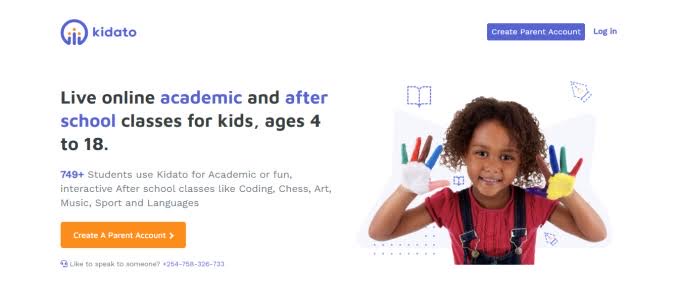YC-backed online school Kidato secures $1.4M seed to expand its online learning for K-12 students in Africa
- Posted on April 27, 2021
- Technology
- By Glory

Education technology startup Kidato recently secured a $1.4 million seed to expand its reach and online learning operations for K-12 students in Africa.
According to TechCrunch, the funding round included participants such as Learn Start Capital, Launch Africa Ventures Fund, Graph Ventures, and Century Oak Capital, among other notable angel investors in and outside Africa.
The startup was created as a solution to the problem of poor education standards and access to learning in Africa. Most public schools across Africa have similar challenges of overcrowded classrooms, poor learning facilities, and a lesser number of qualified teachers. The problem of large classrooms faces the teachers with more students than they can handle, creating much work for the teachers and leaving many students unattended.
On the other hand, private schools tend to fix this problem of overcrowded classrooms by limiting the number of students per classroom so the teachers can focus on a smaller number. The challenge, however, is that most private schools are unaffordable for the lower class and average middle class.
Kidato was founded by Kenyan serial entrepreneur Sam Gichuru in 2020, to address this learning problem. It is an online school for K-12 students in Africa who have keen interest in education but have little to no access to it.
Gichuru is a father of three kids who encountered similar education problems growing up in a typical middle-class Kenyan home. There was the struggle to keep up with the overpriced yearly tuition fees of private schools, sometimes as high as $8,000 per year.
“I have three kids. I moved them from private schools to homeschooling because that was the next option to give them the same quality of education but at an affordable price,” Gichuru told TechCrunch. “That was when I started noticing the other challenges private schools had.”
He added that typically, the average ratio of teacher to students in public school is 1:50. While the ratio for an average private school is 1:20, sometimes the ratio could be less for a higher amount of tuition fee.
“Depending on how much you pay for school fees. The more prestigious the school, the smaller the teacher-to-student ratio. That for me was a big indicator that you want to have a smaller number of students per teacher,” Gichuru said.
Kidato was launched in 2020, in the middle of the COVID-19 crisis. It provided a solution to help kids continue learning evening in the pandemic. Video services like Zoom and online platforms like Google Classroom have become the norm for learning for the middle class in Africa with access to high internet accessibility.
Gichuru told TechCrunch that another problem he identified was the issue of long commutes for students in public schools who had to travel miles from their houses to get to school. Some wake up as early as 5 a.m. to begin their commuting. Online learning helps to cut commute time, keeps the students more relaxed while learnings, and allows them more time to spend with their families.


Be the first to comment!
You must login to comment